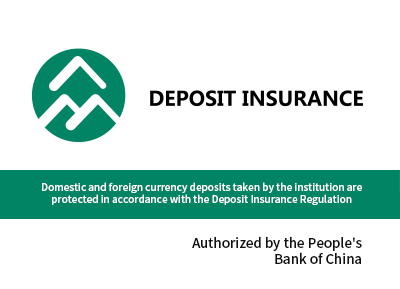Domestic and foreign currency deposits taken by the institution are protected in accordance with the Deposit Insurance Regulation. All financial institutions participating in deposit insurance are authorized by the People's Bank of China to use the following deposit insurance logo. The list of financial institutions participating in the deposit insurance can be found on the website of the People's Bank of China (website: www.pbc.gov.cn).

Frequently asked questions about deposit insurance (Q&A)
1. What is deposit insurance?
Deposit insurance, also known as deposit guarantee, means that the state provides a clear legal guarantee for public deposits through legislation so as to promote the healthy development of the banking industry.
2. What is the deposit insurance coverage?
According to the Deposit Insurance Regulation, deposit insurance covers commercial banks, rural cooperative banks, rural credit cooperatives, and other deposit-taking banking financial institutions formed within the territory of China.
Insured deposits include the RMB deposits and foreign currency deposits taken by institutional policyholders, except the interbank deposits of financial institutions, deposits of the senior executives of institutional policyholders in their own institutions, and other deposits which shall not be insured as prescribed by the deposit insurance fund management institution.
3. What is the insurance coverage limit?
According to the Deposit Insurance Regulation, the deposit insurance has a coverage limit, and the maximum amount of coverage is RMB 500,000. If the amount of principal and interest of deposits in all insured deposit accounts owned by the same depositor at the same institutional policyholder is less than the maximum amount of coverage, the deposits shall be paid in full. However, deposits exceeding RMB 500,000 are not entirely without protection. Even if individual banks encounter problems, measures may be taken to utilize market mechanisms and deposit insurance funds to facilitate the acquisition of problematic banks by healthy banks and transfer the deposits from the problematic banks to healthy ones, thus ensuring that depositors' rights and interests are fully protected.
4. Do depositors need to pay premiums?
No, they do not. Deposit insurance, as part of the national financial safety net, is primarily funded by premiums paid by financial institutions as required. The main purpose of collecting premiums is to strengthen market constraints on financial institutions and promote prudent operation and healthy development of banks.
5. Under what circumstances should reimbursement be made?
Under any of the following circumstances, a depositor shall have the right to request the deposit insurance fund management institution to, within the limit set by this Regulation, use the deposit insurance fund to pay the depositor's insured deposits: (1) The deposit insurance fund management institution serves as the organization to take over institutional policyholders. (2) The deposit insurance fund management institution conducts liquidation of canceled institutional policyholders. (3) The people's court decides on and accepts the bankruptcy applications of institutional policyholders. (4) Other circumstances approved by the State Council. To ensure the promptness of reimbursement and fully protect the rights and interests of depositors, the Regulation stipulates that the deposit insurance fund management institution shall fully pay deposits within seven working days as of the day when the circumstance mentioned above occurs.
6. When will the Regulation be implemented?
The Deposit Insurance Regulation has come into force since May 1, 2015.